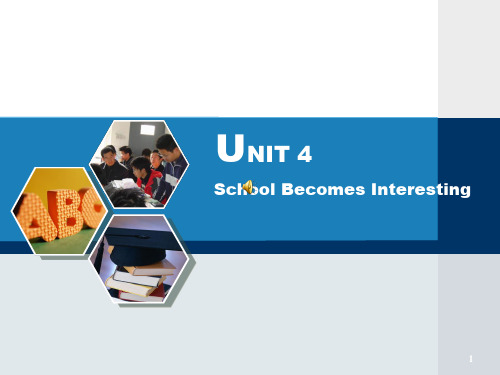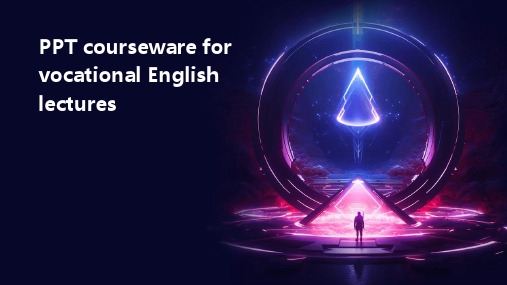英语,中职英语课件ppt课件
合集下载
中职英语基础模块1ppt课件

Social hierarchy
United Kingdom
Home to the English language, the United Kingdom is also known for its rich history, culture, and literature.
The United States is a global superpower with a diverse population and a thriving economy.
Listening Comprehension
The ability to understand the context of the spoken language, including cultural, social, and historical backgrounds, which helps in better comprehension of the information.
Canada is a multicultural country with a strong sense of national identity and a rich history.
Australia is known for its unique wildlife, beautiful landscapes, and a laid-back lifestyle.
Cross-cultural communication
03
To enhance students' ability to communicate effectively in English in a cross-cultural environment.
中职英语职业模块工科类PPT课件

7. Dress simply so as not to draw too much attention. 着装要朴素大方,不要引起过多的关注。 8. Listen and then listen more to learn the ropes. 要多聆听,摸清做好工作的门道。 9. In conversations, use people’s names as often as possible. 在谈话中,尽量多使用对方的名字。 10. You’ll quickly discover the nature of the employees’ relationships. 你会很快发现员工之间关系的本质。 11. Every company has its own style and pace for doing work. 每个公司都有它自己的工作风格和节奏。
16. It is possible that the two of you started off on the wrong foot. 你俩的关系很有可能从一开始就出现了问题。 17. Sometimes it is helpful to try to put yourself in their shoes. 有时候你需要尽量从别人的角度来考虑问题。 18. All living things depend on the sun for their growth. 万物生长靠太阳。 19. The meeting will deal with these problems. 本次会议将处理这些问题。
7. The supplied clip is not suitable for use on tubes. 提供的灯夹不适合安装在圆管上。 8. Being able to read a flowchart is quite easy once you understand the
中职英语第一册课件-PPT

visit hot
best
neither nor
summer
’d ___ to ___ Jinan. How’s the ___ ere? It’s always ___in ______and____in __.
____is the __S_tseepas7onFinilJl iinnanth? e bl
wear T-shirt…
winter: make a snowman, skate…
spring: fly kites, have a picnic, play
sports, plant trees…
fall: go hiking, climb mountains…
25
What
like
autumn
favorite season. Homew
28
·
29
13
autumn
cool
14
It’s cool. It’s not hot. It’s dry. Leaves fall and fall. They’re yellow.
It’s cold. It’s not warm. It’s dry. The wind blows and blows. We can make a snowman.
17
F T FT
I’d like to… How’s the weather there? What’s the weather like there?
hat is theSbteepst4seRaseoand iannjdinafinnd? t’s neither hot nor cold. (重点分 ou’d better come here in autumn
中职英语课件 school life【优质PPT】

Zhang Yu: So you must learn English well to read them. Lin Wei: Thank you for your advice.
17
Listening and Speaking
Decide true ( T ) or false ( F ) .
1. Lin Wei’s school is the same as other high schools.
n. 工厂
10
Warming up
Answer the questions. 1. How many hours do you study in the classroom every day? 2. Do you have PE class? 3. Do you go to workshops or factories to learn practical skills?
beside
2. Besides / Beside Chinese, I also study English and French.
Besides
3. I always go to school on / by foot.
on
4. This school is different from / with other schools. from
Learning Tips:
阅读英文文章时,无须
对每一个词都同等重视。可
以采用跳读法,即让目光从
一个“字群” 跳到另一个
“字
群”,从一个主要信息跳到
9
For Better Performance
10
My Progress Check
3
17
Listening and Speaking
Decide true ( T ) or false ( F ) .
1. Lin Wei’s school is the same as other high schools.
n. 工厂
10
Warming up
Answer the questions. 1. How many hours do you study in the classroom every day? 2. Do you have PE class? 3. Do you go to workshops or factories to learn practical skills?
beside
2. Besides / Beside Chinese, I also study English and French.
Besides
3. I always go to school on / by foot.
on
4. This school is different from / with other schools. from
Learning Tips:
阅读英文文章时,无须
对每一个词都同等重视。可
以采用跳读法,即让目光从
一个“字群” 跳到另一个
“字
群”,从一个主要信息跳到
9
For Better Performance
10
My Progress Check
3
中职英语教案课件ppt课件ppt

meanings) and antonyms (words with opposite meanings) and
give examples of each
03
Skill improvement
Reading skills
Reading comprehension
Provide exercises and activities to improve students' ability to understand and analyze the content of the text
Provide opportunities for students to practice giving presentations, focusing on voice control, language clarity, and audience engagement
Debate and discussion
Course outline
Business negotiations and deals with clients Unit 3: Cross cultural Communication
Understanding cultural differences in business communication
Subordinate
clauses
Teach students how to recognize and analyze sub ordinate clauses, including their structure and function in sentences
Vocabulary knowledge
Oral skills
中职英语说课ppt课件ppt课件

response
CHAPTER
01
Overview of lecture content
Course name and textbook version
Course name
"Advanced Business English Communication"
Textbook version
"English for Business Communication, 3rd Edition"
Evaluation criteria and methods
Knowledge and understanding
Assessing students' knowledge and understanding of vocational English topics through quizzes, tests, and assignments.
Regular formative assessments should be conducted to monitor student progress and identify areas where further support is required.
CHAPTER
04
Teaching activities and evaluation
03
Writing ability
Develop students' ability to write coherent and grammatically correct English sentences and paragraphs.
Emotional attitudes and values goals
CHAPTER
01
Overview of lecture content
Course name and textbook version
Course name
"Advanced Business English Communication"
Textbook version
"English for Business Communication, 3rd Edition"
Evaluation criteria and methods
Knowledge and understanding
Assessing students' knowledge and understanding of vocational English topics through quizzes, tests, and assignments.
Regular formative assessments should be conducted to monitor student progress and identify areas where further support is required.
CHAPTER
04
Teaching activities and evaluation
03
Writing ability
Develop students' ability to write coherent and grammatically correct English sentences and paragraphs.
Emotional attitudes and values goals
中职英语第一册unit 1PPT课件

的)
❖polite(有礼貌的) ❖hardworking(勤奋的) ❖helpful
Follow the example and make dialogues
❖A: I’m back from Hangzhou? ❖B: What do you think of Hangzhou? ❖A: It’ s a very beautiful place. ❖B: Do you like the people there? ❖A: Yes. They are very nice.
Bob: Oh, it must be very busy and noisy. Susan: Yes. But I like it. People there are nice and
friendly.
Listening
Listen and tick the answers. How does Susan find London?
√ America √ beautiful √ Chinese merican √ Britain √ clean √ France √ modern
Listen to the dialogue and answer.
Bob: Hi, Susan. Long time no see. Susan: Yes. I’m just back from London.
Bob: How did you find it? Susan: It’s a big city.
2
Make dialogues according to the listening material
3
Free talk the feeling about the different people and places
❖polite(有礼貌的) ❖hardworking(勤奋的) ❖helpful
Follow the example and make dialogues
❖A: I’m back from Hangzhou? ❖B: What do you think of Hangzhou? ❖A: It’ s a very beautiful place. ❖B: Do you like the people there? ❖A: Yes. They are very nice.
Bob: Oh, it must be very busy and noisy. Susan: Yes. But I like it. People there are nice and
friendly.
Listening
Listen and tick the answers. How does Susan find London?
√ America √ beautiful √ Chinese merican √ Britain √ clean √ France √ modern
Listen to the dialogue and answer.
Bob: Hi, Susan. Long time no see. Susan: Yes. I’m just back from London.
Bob: How did you find it? Susan: It’s a big city.
2
Make dialogues according to the listening material
3
Free talk the feeling about the different people and places
中职英语高教版基础模块1第1单元《Personal—Understanding》课件

Unit 1
英语1 基础模块
05
Culture Understanding
Culture Understanding
1、Warming up 2、Culture Understanding 3、Group discussion 4、Homework
Words and Expressions
community /kəˈmjuːnəti/ n. 社区 cook /kʊk/ v. 烹饪 energetic /ˌenəˈdʒetɪk/ adj. 精力充沛的 especially /ɪˈspeʃəli/ adv. 尤其是 family /ˈfæməli/ n. 家庭 gift /ɡɪft/ n. 礼物 handmade /ˌhændˈmeɪd/ adj. 手工制作的 introduce /ˌɪntrəˈdjuːs/ v. 介绍 jog /dʒɒɡ/ v. 慢跑 manager /ˈmænɪdʒə (r)/ n. 经理 notice /ˈnəʊtɪs/ v. 注意到 parent /ˈpeərənt/ n. 母亲或父亲
same in English and in Chinese. We can address people
相同的
称呼
by their full names. For example, Yuan Longping and
部分) of Chinese people put family name before given
name. Family names are so important to us because
重要的Байду номын сангаас
告诉
they tell who our ancestors (祖先) are and where we
英语1 基础模块
05
Culture Understanding
Culture Understanding
1、Warming up 2、Culture Understanding 3、Group discussion 4、Homework
Words and Expressions
community /kəˈmjuːnəti/ n. 社区 cook /kʊk/ v. 烹饪 energetic /ˌenəˈdʒetɪk/ adj. 精力充沛的 especially /ɪˈspeʃəli/ adv. 尤其是 family /ˈfæməli/ n. 家庭 gift /ɡɪft/ n. 礼物 handmade /ˌhændˈmeɪd/ adj. 手工制作的 introduce /ˌɪntrəˈdjuːs/ v. 介绍 jog /dʒɒɡ/ v. 慢跑 manager /ˈmænɪdʒə (r)/ n. 经理 notice /ˈnəʊtɪs/ v. 注意到 parent /ˈpeərənt/ n. 母亲或父亲
same in English and in Chinese. We can address people
相同的
称呼
by their full names. For example, Yuan Longping and
部分) of Chinese people put family name before given
name. Family names are so important to us because
重要的Байду номын сангаас
告诉
they tell who our ancestors (祖先) are and where we
- 1、下载文档前请自行甄别文档内容的完整性,平台不提供额外的编辑、内容补充、找答案等附加服务。
- 2、"仅部分预览"的文档,不可在线预览部分如存在完整性等问题,可反馈申请退款(可完整预览的文档不适用该条件!)。
- 3、如文档侵犯您的权益,请联系客服反馈,我们会尽快为您处理(人工客服工作时间:9:00-18:30)。
英语
基础模块
上册
.
Unit 4 Entertainment
Objectives
1 能够辨别/ʊ/和/ɒ/, /ɒ/和/aʊ/, /z/和/ð/, /t/和/θ/ 在句子中的发音的不同, 并能正确掌握其发音。 2 掌握本单元出现的词汇、短语和句型,并能用一些简单的 短语、句型进行询问娱乐活动。 3 掌握情态动词 (can, may, must) 的用法。
.
Group 3 /ð/and /z/ Script
(1) Open that eye and close the other. (2) People, animals and plants breathe air.
.
Group 4 /θ/and /t/ Script
(1) My father taught me to ride a bicycle. (2) Both the sisters are not here.
.
Section B Listening and Speaking
Warm-up
Dialogue Study
Activities
.
Warm-up
What kind of entertainments do you like? Write down your answer in the box, and talk about it with your partner.
.
Phrases
every day 每天 be bad for 对……有害
.
Notes
1. Do you like watching TV? 你喜欢看电视吗? watch 是及物动词,意思是"观看、注视",用来指注视移动 着的物体,如看电视、看球赛、看戏等。 另外,look, look at, see都有"看"的意思,但用法不同。 look为不及物动词,后面不能带宾语,常单独使用,以引起对 方注意。例如: Look! That's an English car. 看!那是一辆英国的小汽车。 look at是由动词look 与介词at组成的词组,相当于及物动词, 后面可以带宾语,侧重"看"的动作。例如: Look at the blackboard, please. 请看黑板。 see为及物动词,意为是"看见",侧重"看"的结果。例如: Can I see your new pen? 我可以看看你的新钢笔吗?
KTV reading
swimming Entertainments
watch avid, S=Sarah) D: Do you like watching TV? S : Yes, I watch TV every day. D: How long do you watch TV every day? S : About three hours. D: What’s your favorite program? S : Films. Sometimes I watch movies on TV till midnight. D: I think it’s bad for your health. If you don’t have enough rest, you will be very tired next day. Work must come first. Don’t you think so? S : Maybe you’re right. I think I should take your advice.
.
II. Listen to the tongue twister and repeat.
Tom got a lot of dots on his pocket. If he wants to wash off the dots, he will use a pot of hot water.
How much wood would a woodchuck chuck if a woodchuck could chuck wood? He would chuck, he would, as much as he could, and chuck as much wood as a woodchuck would if a woodchuck could chuck wood.
New Words
Phrases
Notes
.
New Words
watch /wɒtʃ/ v. 看,注视 favorite /'feɪvərɪt/ adj. 特别喜爱的 program /'prəʊɡræm/ n. 节目 film /fɪlm/ n. 电影 sometimes /'sʌmtaɪmz/ adv. 有时 movie /'muːvɪ/ n. 电影 till /tɪl/ conj. 直到……为止 midnight /'mɪdnaɪt/ n. 午夜,子夜 health /helθ/ n. 健康 enough /ɪ'nʌf/ adj. 足够的,充足的 rest /rest/ n. 休息时间 tired /'taɪəd/ adj. 疲倦的,疲劳的 must /mʌst/ aux. v. 必须 maybe /'meɪbɪ/ adv. (不确定) 大概,或许,可能 advice /əd'vaɪs/ n. 劝告,忠告,建议
Group 1 /ʊ/ and /ɒ/ Script
(1) He must be a famous cook. (2) Put the box in a quiet place.
.
Group 2 /ɒ/ and /aʊ/ Script
(1) A cow produces milk. (2) I'm sorry to shock you.
.
Highlights
Entertainment
Pronunciation Listening and Speaking
Reading Grammar
Writing
.
Section A Pronunciation
I. Listen to the recording and tick the word you've just heard in each sentence.
基础模块
上册
.
Unit 4 Entertainment
Objectives
1 能够辨别/ʊ/和/ɒ/, /ɒ/和/aʊ/, /z/和/ð/, /t/和/θ/ 在句子中的发音的不同, 并能正确掌握其发音。 2 掌握本单元出现的词汇、短语和句型,并能用一些简单的 短语、句型进行询问娱乐活动。 3 掌握情态动词 (can, may, must) 的用法。
.
Group 3 /ð/and /z/ Script
(1) Open that eye and close the other. (2) People, animals and plants breathe air.
.
Group 4 /θ/and /t/ Script
(1) My father taught me to ride a bicycle. (2) Both the sisters are not here.
.
Section B Listening and Speaking
Warm-up
Dialogue Study
Activities
.
Warm-up
What kind of entertainments do you like? Write down your answer in the box, and talk about it with your partner.
.
Phrases
every day 每天 be bad for 对……有害
.
Notes
1. Do you like watching TV? 你喜欢看电视吗? watch 是及物动词,意思是"观看、注视",用来指注视移动 着的物体,如看电视、看球赛、看戏等。 另外,look, look at, see都有"看"的意思,但用法不同。 look为不及物动词,后面不能带宾语,常单独使用,以引起对 方注意。例如: Look! That's an English car. 看!那是一辆英国的小汽车。 look at是由动词look 与介词at组成的词组,相当于及物动词, 后面可以带宾语,侧重"看"的动作。例如: Look at the blackboard, please. 请看黑板。 see为及物动词,意为是"看见",侧重"看"的结果。例如: Can I see your new pen? 我可以看看你的新钢笔吗?
KTV reading
swimming Entertainments
watch avid, S=Sarah) D: Do you like watching TV? S : Yes, I watch TV every day. D: How long do you watch TV every day? S : About three hours. D: What’s your favorite program? S : Films. Sometimes I watch movies on TV till midnight. D: I think it’s bad for your health. If you don’t have enough rest, you will be very tired next day. Work must come first. Don’t you think so? S : Maybe you’re right. I think I should take your advice.
.
II. Listen to the tongue twister and repeat.
Tom got a lot of dots on his pocket. If he wants to wash off the dots, he will use a pot of hot water.
How much wood would a woodchuck chuck if a woodchuck could chuck wood? He would chuck, he would, as much as he could, and chuck as much wood as a woodchuck would if a woodchuck could chuck wood.
New Words
Phrases
Notes
.
New Words
watch /wɒtʃ/ v. 看,注视 favorite /'feɪvərɪt/ adj. 特别喜爱的 program /'prəʊɡræm/ n. 节目 film /fɪlm/ n. 电影 sometimes /'sʌmtaɪmz/ adv. 有时 movie /'muːvɪ/ n. 电影 till /tɪl/ conj. 直到……为止 midnight /'mɪdnaɪt/ n. 午夜,子夜 health /helθ/ n. 健康 enough /ɪ'nʌf/ adj. 足够的,充足的 rest /rest/ n. 休息时间 tired /'taɪəd/ adj. 疲倦的,疲劳的 must /mʌst/ aux. v. 必须 maybe /'meɪbɪ/ adv. (不确定) 大概,或许,可能 advice /əd'vaɪs/ n. 劝告,忠告,建议
Group 1 /ʊ/ and /ɒ/ Script
(1) He must be a famous cook. (2) Put the box in a quiet place.
.
Group 2 /ɒ/ and /aʊ/ Script
(1) A cow produces milk. (2) I'm sorry to shock you.
.
Highlights
Entertainment
Pronunciation Listening and Speaking
Reading Grammar
Writing
.
Section A Pronunciation
I. Listen to the recording and tick the word you've just heard in each sentence.
